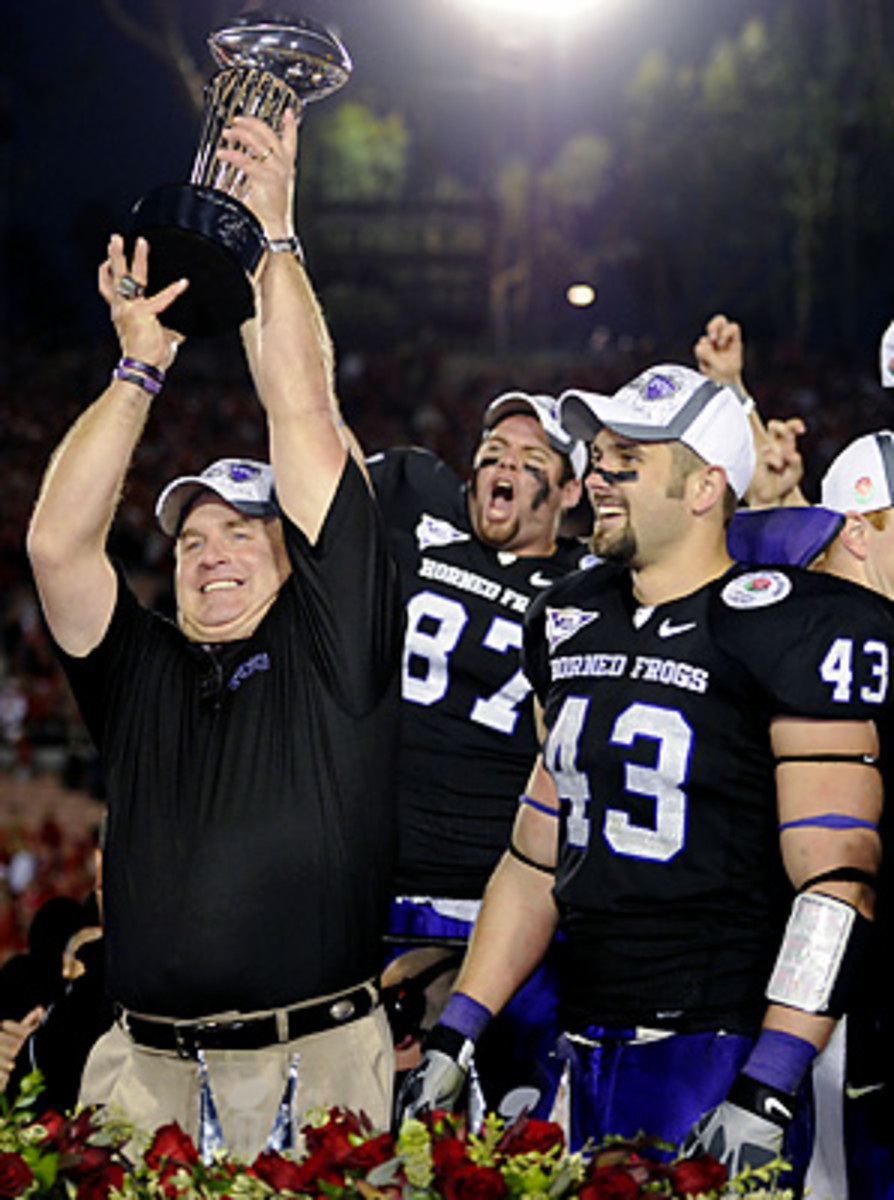Move to Big 12 solidifies TCU's championship aspirations
FORT WORTH, Texas -- On the front wall of TCU's football team meeting room is a pyramid. At the bottom are abstract concepts such as Attitude and Chemistry. As the Horned Frogs climb the pyramid, their goals get much more specific. One space from the top, the goal is "GO TO BCS BOWL & WIN." TCU did that last year. At the top, the goal is "#1 NATIONAL CHAMPIONS."
TCU didn't do that last year, despite going 13-0 and winning the Rose Bowl. Until Thursday, the idea of an undefeated TCU team being allowed to play for the national title -- even if it came from the Big East -- was an iffy proposition at best. Not anymore. When TCU's move to the Big 12 becomes official either Friday or early next week, coach Gary Patterson can tell his team with confidence that if the school of Slingin' Sammy Baugh and Davey O'Brien can run the table, it can play for the national title.
The sounds of construction at Amon G. Carter Stadium played a joyful tune Thursday. The school recently raised $143 million to renovate the stadium -- $90 million from the sale of just six luxury suites -- then blew up the old stadium on the same day TCU received its invitation to the Rose Bowl last year. Thursday's concert also included an aria of ringing phones in the TCU ticket office. The calls for season tickets began coming before the Big 12 sent a release acknowledging negotiations with TCU. Curious employees checked the message boards and realized something was up. When the release came, the calls intensified. The stadium expansion project would have topped off at about 44,000 seats. Now, with visits from Sooners and Longhorns and Cowboys on the horizon, TCU officials are wondering whether they should go 50-plus.
Meanwhile, the Big East is reeling as one of its last hopes for football relevance left without ever playing a game as a conference member. With Pittsburgh and Syracuse departing for the ACC and TCU staying closer to home, the Big East is left with six football-playing members. One of those, Louisville, is a rumored target of the Big 12 should Missouri decide to bolt for the SEC. Another, West Virginia, could be another Big 12 target should the league decide to expand back to a mathematically correct 12 members.
And what about Missouri? The Associated Press reported Wednesday that an anonymous school official said the Tigers originally wanted to go to the Big Ten, but, failing to receive an invitation, they turned their attention to the SEC. For some reason, this was treated as some sort of major revelation. Anyone who followed realignment last year knew that Mizzou had hiked up her skirt the minute the Big Ten announced in early 2010 that it intended to expand, and anyone who followed realignment last year knew the Big Ten only had eyes for Nebraska.
Does Missouri have the votes to get into the SEC? That isn't clear because as of Thursday afternoon, the presidents hadn't taken their informal poll -- the vote that actually counts before the unanimous vote that they'll ultimately announce when they decide what they want to do. If SEC commissioner Mike Slive believes the Tigers can help the league and senses he's just a little short on support, he can twist the correct arms and make sure Missouri has the necessary nine votes. If he doesn't believe they'll help, he can do the same in the opposite direction. The SEC probably doesn't need to worry about any legal reprisal from any Big 12 member. After all, the Big 12 did mount a full frontal assault on the Big East on Thursday.
Shortly after the Big 12 announced its flirtation with TCU, it announced that eight members had voted to grant Tier I and II media rights to the league for six years. (Missouri chancellor Brady Deaton, on the advice of the school's attorneys, did not vote on expansion or the granting of rights. Considering Missouri is actively contemplating leaving the league, it has a bit of a conflict of interest.) League members also agreed to ban high school games and -- this is important -- high school highlights on institution-branded networks such as Texas' Longhorn Network. The ban on highlights came even though the NCAA hasn't actually banned the practice. This was a major concession from Texas; the Longhorns had to bend in order to make other members comfortable enough to stay in the league.
We'll have to wait to find out whether those moves are enough to sway Missouri. If the Tigers do decide to stay, they'll have to grant their rights to the league as well. The move seems to offer some of the stability Missouri officials craved, but it's unclear whether it will be enough to keep Missouri from seeking membership in the SEC. And even if Missouri seeks membership, it still isn't clear whether the Tigers will get in. At some point in the not-too-distant future, Missouri officials either will announce their unquestioned commitment to the SEC, or they will announce their unquestioned commitment to the Big 12.
Meanwhile, TCU will reunite with former Southwest Conference colleagues Baylor, Texas and Texas Tech. While those schools enjoyed the prosperity of Big 12 membership, TCU scratched and clawed its way through the 16-team Super WAC, Conference USA and the Mountain West. The construction will continue, and next season all those new seats will be packed to welcome the Sooners or Longhorns. Though much of the rest of the college athletics landscape remains in flux, no doubt remains in Fort Worth. TCU hasn't reached the top of its pyramid since 1938, but now the Horned Frogs know they finally have a real chance to scale it again.






